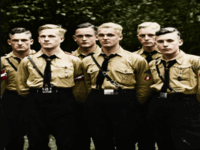 Authoritarians have always understood the power of youth. Mussolini’s Balilla and Hitler’s Hitler Youth were built to mold loyalty before adulthood, using race, faith, and nation to transform politics into destiny. The United States does not face a rebirth of fascism in its old uniform, but Turning Point USA shows how those strategies can be adapted to our time.
Authoritarians have always understood the power of youth. Mussolini’s Balilla and Hitler’s Hitler Youth were built to mold loyalty before adulthood, using race, faith, and nation to transform politics into destiny. The United States does not face a rebirth of fascism in its old uniform, but Turning Point USA shows how those strategies can be adapted to our time.
Turning Point recruits teenagers and college students through flashy rallies, conventions, and branded merchandise that make politics into lifestyle. Like fascist movements that cast schools as battlefields, Turning Point portrays universities as hostile ground, with professors labeled “anti-American.” Its “Professor Watchlist” doesn’t just challenge ideas—it aims to intimidate and silence.
The real force behind this mobilization is the fusion of white and Christian nationalism. Just as European fascists wrapped racial purity in religious symbolism, Turning Point frames America as a Christian nation under siege. White grievance and Christian identity supply a sense of moral urgency, teaching students to see themselves as defenders of a threatened cultural order. This blend makes politics feel like a sacred duty rather than a democratic contest.
Defenders note that Turning Point is voluntary, donor-driven, and non-militarized—hardly the goose-stepping youth brigades of the past. But voluntary does not mean benign. By convincing young Americans that pluralism is weakness, that democracy is expendable, and that loyalty outweighs inquiry, Turning Point cultivates habits of thought that corrode democracy at its roots.
The lesson of the twentieth century is clear: authoritarianism does not begin with dictatorship; it begins by teaching the young to equate exclusion with patriotism and conformity with truth. On that front, Turning Point—fueled by white and Christian nationalism—looks uncomfortably familiar.